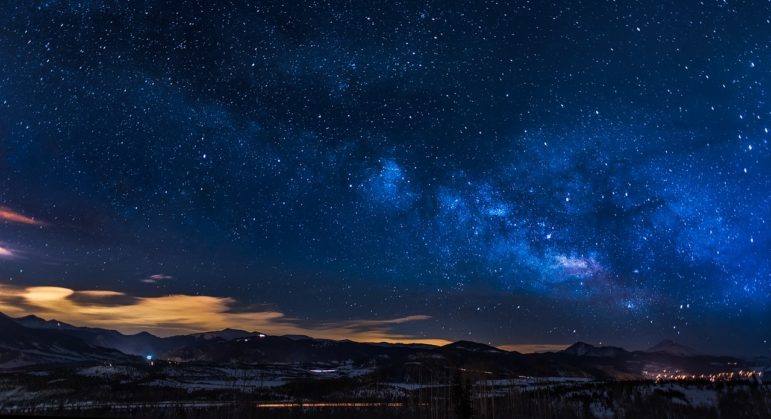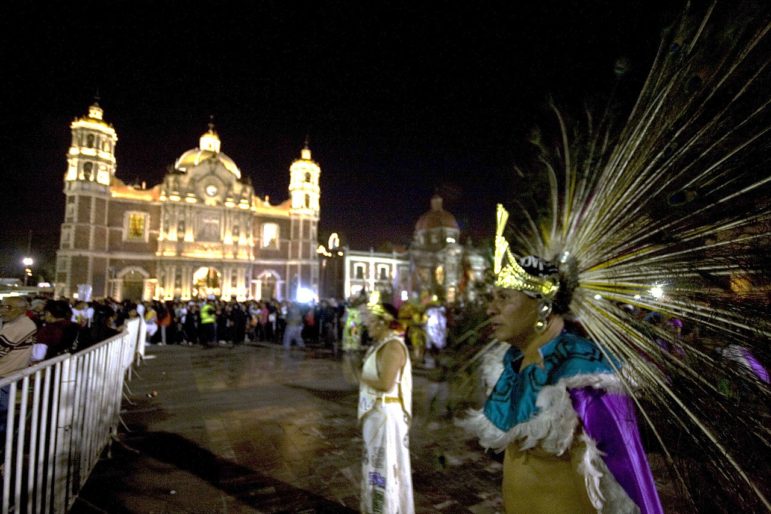
After Samhain and the Day of the Dead, my second favorite part of the year is midwinter. Since I was a child, the winter holidays have always had great meaning to me. I was raised Catholic, so I celebrate Christmas with my family. It was not until my teenage years, when I started walking the Wiccan path and learning about Paganism, that I began celebrating Yule as well. Yule was the Wiccan sabbat with which I felt the deepest relationship.
Without regard to the name of the celebration or the phase of my life, the celebration has always had the same main meaning to me: it has always represented hope. After the darkness of the longest night of the year, the sun is reborn – and with this rebirth, light is rekindled in our hearts and spirits. After this very difficult year, I think hope is what we need the most.

The night sky over Colorado [Pixabay]
Our lives completely changed with the COVID-19 pandemic. Many have lost their jobs or businesses, while others have been struggling to keep them, on thin ice, and with work overload. With children staying at home, parents have had more challenges than usual. Many people have lost loved ones or have needed to take care of their loved ones. With social distancing and security measures, we haven’t been able to interact with each other and move around as we used to. Our physical, mental, emotional, and spiritual healths have been at risk.
Thinking about what I was doing a year ago makes me realize how lucky I was, and that I was not fully aware of it. I was able to travel and meet people from other parts of the country and the world, but I did not travel often, thinking I could always do it later. I was able to freely walk around the city and smile at the people in front of me, but I would often stay at home to watch TV and read. I had infinite choice of things to do, and now my options are limited. I think about the regrets I have, about all the things I could have done but found too many reasons to not do them.
For many of us, the way we practice our beliefs has changed as well. Authorities have restricted large gatherings or visits to places of worship. This year’s Day of the Dead, celebrated on November 1-2, was different. Following the Mexican national government’s request, most of the cemeteries were closed to avoid large crowds. The government suggested and asked people to celebrate at home instead of visiting their dead loved ones’ graves.
Millions of people would be gathered today at the Basilica of Our Lady of Guadalupe, but this year the Catholic church decided to close its doors. The church authorities said this is the first time in its history that the temple is closed on December 12. What has been one of the largest pilgrimages in the world, this year is a celebration at home or in each local community.

A photograph of people waiting outside of the Basilica of Our Lady of Guadalupe in Mexico City in December, 2010 [Coleccionista320, Wikimedia Commons, CC 4.0]
Even if we do not usually visit places of worship, we are currently not able to celebrate a ritual with others and in person as we used to. Although I have noticed some Pagan groups are already meeting in small gatherings and with safety measures, some people, like me, still don’t feel ready or secure enough to do so, so we practice our spirituality alone or in virtual gatherings.
The way our spiritual practices have changed – being unable to gather or visit places of worship, celebrating at home or virtually, celebrating alone or with our closest people – redirects us to the core and basis of our spirituality, back to our direct relationship with our higher selves, with our ancestors, with deity and spirit.
The pandemic has also changed some of our relationships. People who lived together have struggled with the constant interaction within closed doors. I have seen a lot more discussions and disagreements on social media than usual, people having different opinions about the pandemic and politics, and about how to deal with all of it. As people are not able to easily meet in person, misunderstandings are harder to clarify. I have perceived my community as fragile and, at times, fractured. I believe that during times of change, when the structures of our lives are threatened or are shattered, it is normal for tense and heated conversations to emerge more often.
During the chaotic times of the Tower, differences come to the surface. When the tower is falling, some people want to flee, while others are too scared to move and get out. Some people stop to help others, while others can’t help themselves. Some people create safe passages for the others to come out of the tower, while others discuss why the tower is falling. Some blame a lack of maintenance; others say it is because of the materials that were used to build it; others say it is because of the ground it was built on; others say the tower has been destroyed on purpose. While the tower keeps falling, contrast and polarization are more frequent, but these diverse expressions come from the same source – panic, fear, trauma, pain. The person trying to help is afraid. The person who cannot move is afraid. The person looking for explanations is afraid. We may express things differently, but we probably share more than what we see at first.
I plan to celebrate Yule alone and with a virtual ritual this year. While I decorate my Yule-Christmas tree with colorful lights and ornaments, I am painting my hope with my wishes and plans. I visualize the activities I will like to do as soon as I can. I think of the people I would like to see in person. I also set my intentions for my community and the world.
The winter solstice is the longest night of the year, and this year has felt like the longest and darkest night. Through the darkness, we have been reflective and have looked towards the inside. As the sun is reborn, may the light also return to our hearts. May we remember we share the fear and the pain, may we also remember to share the hope. May we remember we are not alone, even when this longest and darkest night has felt like the loneliest of all, and may we look towards what we want to rebuild together on the longer days to come.
The Wild Hunt always welcomes guest submissions. Please send pitches to eric@wildhunt.org.
The views and opinions expressed by our diverse panel of columnists and guest writers represent the many diverging perspectives held within the global Pagan, Heathen, and polytheist communities, but do not necessarily reflect the views of The Wild Hunt Inc. or its management.
The Wild Hunt is not responsible for links to external content.
To join a conversation on this post:
Visit our The Wild Hunt subreddit! Point your favorite browser to https://www.reddit.com/r/The_Wild_Hunt_News/, then click “JOIN”. Make sure to click the bell, too, to be notified of new articles posted to our subreddit.